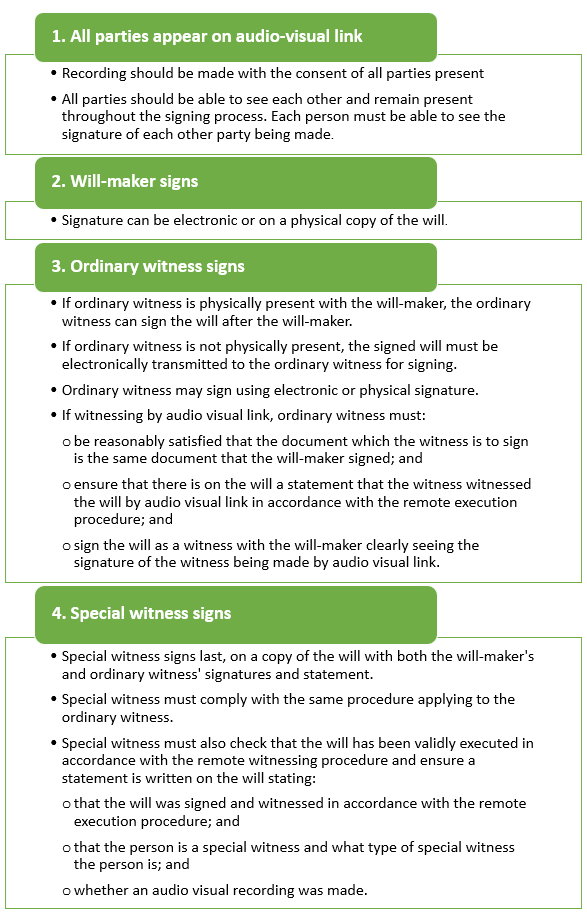
Electronically witnessed wills are here to stay - for good?
Wills and Estates: 28 March 2021
The Victorian Government has recently enacted sweeping changes to the way Wills and many other documents can be witnessed in Victoria. The new laws, passed on 23 March 2021, now allows Wills to be signed electronically and witnessed via audiovisual link, and come into effect from 26 April 2021.
Many of these changes have been in place on a temporary basis pursuant to the COVID-19 Omnibus (Emergency Measures) Act 2020 and accompanying regulations. Now, with the passing of the Justice Legislation Amendment (System Enhancements and Other Matters) Act 2021 these changes will become permanent in Victoria as amendments to the Wills Act 1997. However, there are some important changes in the procedures that practitioners must become familiar with.
What was the law pre-COVID-19?
Prior to 12 May 2020 a Will would only be validly executed in Victoria if it was physically signed by the will-maker in the physical presence of two adult witnesses.
The Electronic Transactions (Victoria) Act 2000 allowed for most documents in Victoria to be validly executed by electronic means, but the regulations specifically excluded Wills and testamentary documents from the operation of the Act.
Many electronic documents such as Microsoft Word documents, text messages, iPhone 'notes' and videos have been admitted to probate by the Courts as 'informal wills'. However, there is always a risk that the electronic document would not be admitted to probate in this way due to its invalid execution.
What was the law during COVID-19?
After COVID-19 hit, and social distancing and other restrictions on physical contact were imposed throughout the world, the law had to adapt to the new climate. In Victoria, temporary measures were adopted allowing wills and other documents to be signed and witnessed remotely.
The provisions were quite complex, and our Daniel Black wrote about these procedures here:
Following the procedures precisely has proved to be difficult. In a recent webinar for the Australasian Cyber Law Institute, the Victorian Registrar of Probates Kate Price said that of the seven applications the Supreme Court had received with wills attempting to comply with the regulations, none had properly complied with the regulations (and were therefore all invalid wills).
What is the law now?
The Wills Act 1997 now includes new sections 8A-8D which prescribe a new 'remote witnessing procedure'. A Will signed in Victoria in accordance with this procedure is a valid Will.
The law applying to wills is usually the law of the state or country where they are signed. For the purposes of the remote witnessing procedure, where the will-maker and witnesses may be in entirely different places or countries, s 8B(1) provides that the place of execution "is the place where the testator is located at the time the will is executed. This means that if the will-maker is not in Victoria when the will is executed, the remote witnessing procedure is unlikely to be available as Victorian law will not apply to them. However, a will signed out of Victoria using the procedure may still be valid to the extent that it deals with real property in Victoria.
Remote execution procedure
The requirements of the new 'remote execution procedure' are set out below.
Parties

Process

Practitioners are encouraged to review and follow the provisions of the Wills Act 1997 to ensure they have complied with the law.
After the procedure has been followed, the actual Will is the document that has been checked and signed by the special witness, and not the version signed by the will-maker.
An important change from the procedure under the COVID-19 Omnibus legislation is that the witnesses must 'ensure' that the will contains a statement as to the formalities of execution. This replaces a requirement that any statement regarding compliance with the audio visual witnessing procedure must be 'written on' the will, which meant that a pre-written statement failed to comply with the Regulations and resulted in an invalid will.
Another important change is that all parties must consent to a recording of the remote execution procedure being made.
Conclusion
The remote execution procedure continues to be a complex and highly prescribed procedure. Given that the consequences of failing to follow the procedure perfectly are that the will is invalid, and their testamentary wishes may not be carried out, great caution should be exercised in using the procedure.
Victorians are currently thankful that the spread of COVID-19 has been contained and that limitations on social contact have been virtually eliminated. In the current climate we would recommend that the remote execution procedure be adopted only as a measure of last resort. However, we consider the introduction of electronic signing and witnessing of wills is a welcome measure and we are fascinated to see what further developments will occur as the law and technology continue to intersect.
If you would like more information on electronic witnessing of wills, enduring powers of attorney, deeds and other documents, contact our Wills and Estates team on (03) 8600 6080.